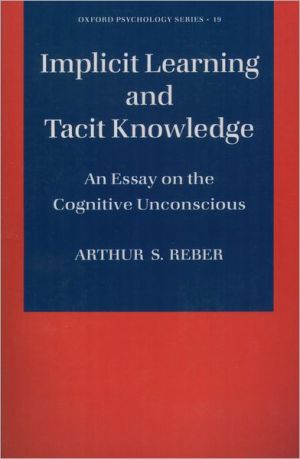Implicit Learning and Tacit Knowledge: An Essay on the Cognitive Unconscious
In this new volume in the Oxford Psychology Series, the author presents a highly readable account of the cognitive unconscious, focusing in particular on the problem of implicit learning. Implicit learning is defined as the acquisition of knowledge that takes place independently of the conscious attempts to learn and largely in the absence of explicit knowledge about what was acquired. One of the core assumptions of this argument is that implicit learning is a fundamental, "root" process,...
Search in google:
In this new volume in the Oxford Psychology Series, the author presents a highly readable account of the cognitive unconscious, focusing in particular on the problem of implicit learning. Implicit learning is defined as the acquisition of knowledge that takes place independently of the conscious attempts to learn and largely in the absence of explicit knowledge about what was acquired. One of the core assumptions of this argument is that implicit learning is a fundamental, "root" process, one that lies at the very heart of the adaptive behavioral repertoire of every complex organism. The author's goals are to outline the essential features of implicit learning that have emerged from the many studies that have been carried out in a variety of experimental laboratories over the past several decades; to present the various alternative perspectives on this issue that have been proposed by other researchers and to try to accommodate these views with his own; to structure the literature so that it can be seen in the context of standard heuristics of evolutionary biology; to present the material within a functionalist approach and to try to show why the experimental data should be seen as entailing particular epistemological perspectives; and to present implicit processing as encompassing a general and ubiquitous set of operations that have wide currency and several possible applications. Chapter 1 begins with the core problem under consideration in this book, a characterization of "implicit learning" as it has come to be used in the literature. Reber puts this seemingly specialized topic into a general framework and suggests a theoretical model based on standard heuristics of evolutionary biology. In his account, Reber weaves a capsule history of interest in and work on the cognitive unconscious. Chapter 2 turns to a detailed overview of the experimental work on the acquisition of implicit knowledge, which currently is of great interest. Chapter 3 develops the evolutionary model within which one can see learning and cognition as richly intertwining issues and not as two distinct fields with one dominating the other. Finally, Chapter 4 explores a variety of entailments and speculations concerning implicit cognitive processes and their general role in the larger scope of human performance.
1Introductory Remarks3On Learning3On Nativism and Empiricism5On Evolution7On Methods and Measures of the Contents of Consciousness and the Unconscious8On Intelligence and Instruction9A Note on Terminology9A Rapid Historical Overview10A Personal Aside222Implicit Cognition: The Data Base23The Polarity Fallacy23On the Primacy of the Implicit24On Functionalism25Some Assumptions25Experimental Procedures26Empirical Studies of Implicit Learning35Methodological Issues in Implicit and Explicit Learning683Evolutionary Considerations: The Primacy of the Implicit73Some Introductory Remarks73The Evolutionist's Line79An Evolutionary Context for the Cognitive Unconscious80Hypothesized Characteristics of Implicit Systems884Implicit Issues: Some Extensions and Some Speculations108Implicit Learning or Implicit Memory108On Rules111Knowledge Representation120On Consciousness133Prediction and Generation of Events140Nativism and Empiricism147References163Author Index183Subject Index189








